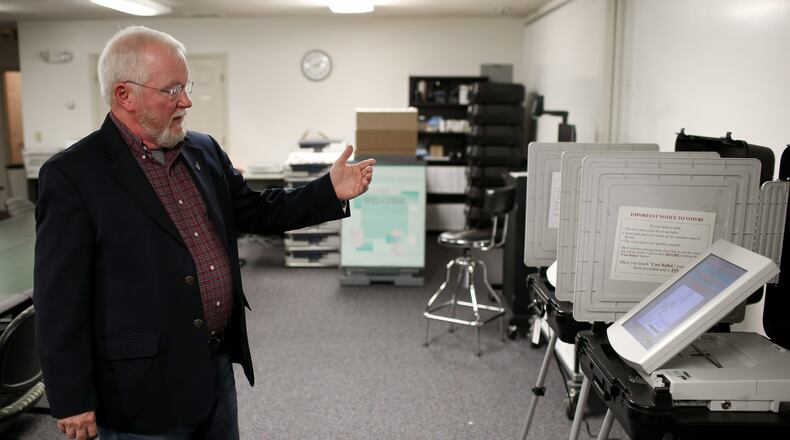We told you Thursday of a databank maintained by the Center for Elections Systems at Kennesaw State University that had been erased in untimely fashion. From this morning's AJC:
The data wipe, first reported by The Associated Press, was revealed in an email sent by a state prosecutor to lawyers representing election transparency advocates who filed the lawsuit in July questioning the security and accuracy of Georgia’s election infrastructure.
The suit demands that Republican Karen Handel’s win in a June 20 runoff be thrown out and the contest redone over concerns some election integrity advocates have about the security and accuracy of Georgia’s election infrastructure. The timeline:
-- The suit was filed on Monday, July 3.
-- The server's data was destroyed Friday, July 7.
-- The plaintiffs' local attorney sent an email July 10 to the defendants' lawyers, i.e., the state of Georgia, reminding them of their obligation to preserve electronic evidence.
The implication, according to the Associated Press, which broke the story:
A Republican state representative, Scot Turner, called Thursday for a criminal investigation. It appears no judge was asked for an order mandating the preservation of evidence. So the defendants could not be held in contempt of court.
Turner and a Democratic colleague, Scott Holcomb of Atlanta, had already planned to introduce legislation in January that would push for a new generation of voting machines – with paper trails.
Late Thursday, another wrinkle was added. Again, from the AJC:
KSU representatives late Thursday issued a statement explaining that the server, which had been examined by the FBI, was wiped so it could be repurposed. School spokeswoman Tammy DeMel said in the statement the FBI made a copy of all of the data on the server before informing KSU it had not been compromised and returning the technology.
DeMel said the university determined the technology on the server had exceeded its life and erased the data to repurpose the device.
(The AJC reported in March that the FBI was investigating an alleged data breach at the election center.)
If the data has not been destroyed and is still accessible, the fallout from this latest episode is likely to be more political than legal. Which explains the quick response from Secretary of State Brian Kemp, a 2018 candidate for governor. From the AJC:
In a lengthy statement, Kemp said his office had no involvement in the decision to wipe the server, nor was it notified in advance.
“We will not stand for this kind of inexcusable conduct or gross incompetence,” said Kemp, whose office oversees Georgia’s elections. “Those responsible at KSU should be held accountable for their actions. The Secretary of State’s Office is also coordinating with FBI officials to get our own copy of the data that was erased at KSU.”
All day Thursday, Kemp’s gubernatorial rivals held their fire. That truce ended this morning. Here’s
of Cumming:
State Sen. Josh McKoon, R-Columbus, a candidate to replace Kemp as secretary of state, also weighed in late Thursday.
"Today’s AP report raises serious legal questions and is troubling to say the least. If it is true, conservatives should have serious concerns about the sanctity of their ballot," McKoon wrote, adding that it "seriously erodes fundamental trust in our electoral process" at a time of shaky public confidence in the government. (Greg Bluestein)
***
Observers of the debate over two new nuclear reactors at Plant Vogtle, whether pro or con, should pay attention to this report from the Associated Press:
The nation's biggest electric grid operator said a Trump administration plan to change the way electricity is priced to reward coal and nuclear power is both unworkable and potentially against the law.
PJM Interconnection, which operates the grid covering 65 million people from Illinois to Washington, D.C., submitted formal comments on the plan late Monday to the Federal Energy Regulatory Commission.
In a conference call with reporters and industry analysts, PJM's president and CEO, Andy Ott, said the plan by Energy Secretary Rick Perry is not "workable."
"In fact, we do believe it's contrary to law and, again, will not really solve any problems," Ott said.
Guaranteeing higher payments to coal, nuclear and other qualifying power plants would probably increase consumers' electric bills, unless FERC found another source of money, Ott said.
***
A third Democrat has entered the race to challenge U.S. Rep. Karen Handel, R-Roswell, in Georgia's Sixth District. Kevin Abel, the co-founder of an IT firm, said he will run as a consensus-builder to "find the common ground for which we Americans so deeply yearn." He joins ex-TV anchor Bobby Kaple and educator Richard Keatley in the bid to unseat Handel. The biggest potential candidate in the field, Jon Ossoff, has recently moved to the district but has not yet said whether he will run again next year. (Greg Bluestein)
***
Talk about shade
thrown in less than 140 characters.
of U.S. Rep. John Lewis, D-Atlanta, on Thursday:
We're wondering if it's enough to draw President Donald Trump into another public fight with the Atlanta congressman. (Tamar Hallerman)
***
Speaking of John Lewis, he said he does not plan to endorse any of the candidates running for Atlanta mayor ahead of Election Day. "I'm staying out of it," Lewis said Thursday. "It's too many candidates, too many friends of mine." (TH)
About the Author
The Latest
Featured





